Theoretical Physics is a Family Business

Harold Baranger remembers his parents discussing physics at the dinner table, and his mother doodling Feynman diagrams during idle moments. Both his parents were theoretical physicists, his father at Carnegie Mellon and MIT and his mother at the University of Pittsburgh — a family setting that nourished his own fascination with science in general and physics in particular.
Baranger, who is retiring in December 2024, grew up to become a successful theoretical physicist himself. After working for 13 years at Bell Labs in Murray Hill, New Jersey, he spent the last 25 years of his career as a professor in the Duke Physics department.
He studies how things work on the quantum level: “The general area I have worked in is quantum transport — how particles, mostly electrons, move through little bits of material,” Baranger said. “My motivation is to understand the beauty and the awesome variety of phenomena that can happen in the physical world.”
As a theoretician, Baranger relies on pencil, paper and computational modeling rather than lab equipment. He comes up with projects by reading about experiments and drawing sketches. “The starting point for any project is cartoon sketches and some kind of an idea of a scenario of what might be an interesting direction to go in,” he said. “I have a 3D picture in my mind and then I try to figure out what to do about it.”
Things can behave strangely in the quantum world, and Baranger revels in that. “What attracts me is a sense of wonder at all these amazing things that can happen that one wouldn’t really expect,” he said.
Although he doesn’t have a lab himself, Baranger enjoys collaborating with experimentalists to test his own ideas and come up with new ones. Fellow Physics professor Gleb Finkelstein said, “He is really open to discussion and collaboration with experimentalists, which is not that common.”
Baranger and Finkelstein have studied how electrons and electricity interact with one or more nano-sized semiconductors called quantum dots, discovering, for example, that in certain situations electrons tunnel through electromagnetic barriers rather than being blocked by them.
Baranger has also worked with Weitao Yang, the Philip Handler Distinguished Professor of Chemistry, on what happens when electrical current flows through a single molecule.
Baranger enjoys untangling “the intricacy of the interactions between the electrons and the quantum mechanics, and what that gives rise to in terms of the properties of the systems.” He’s not necessarily in search of practical applications, though his work could spawn some, particularly related to the areas of quantum computing and quantum sensing.
When Baranger came to Duke from Bell Labs, it meant expanding his responsibilities to include teaching, mentoring, grant-writing and committee work. “I had always wanted to teach,” he said. “I suppose some people are born as great teachers, but for most of us, it’s something you have to learn.” He got his feet wet teaching graduate courses and gradually worked up to the hardest assignment — teaching Introductory Physics.
He ultimately found teaching to be a rewarding part of his career. “With teaching, the students are right in front of you and you get immediate feedback on how you’re doing,” he said. “One thing I really like is the combination of doing some work — research — with long-term rewards, and having some work — teaching — with very concrete week-to-week rewards.”
In retirement, Baranger plans to keep up some of his research on a part-time basis. He will miss the rewards of teaching, but is looking forward to being able to travel with his wife in the spring and fall. He is also looking forward to spending more time with his family, including his two grown children and a two-year-old granddaughter.
While neither of his children is carrying on the family tradition of theoretical physics, Baranger is leaving a legacy through his students and postdocs. “He has a number of scientific descendants who are quite successful,” Finkelstein said, “and I think that’s a statement of his friendly and welcoming nature beyond just how good a physicist he is.”
He legacy will also be felt in the Physics department, which he chaired in the early 2000s. “The department is extremely grateful to Harold for over two decades of service. His leadership will be certainly missed.” said Steffen Bass, Arts and Sciences Distinguished Professor of Physics and current department chair. “We wish him great success in the research endeavors he plans to continue as Emeritus!”